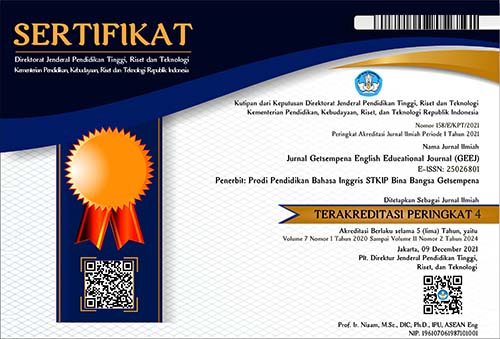THE REALIZATION OF STUDENTS’ POLITE REJECTION SPEECHES
Abstract
This research aims to obtain a deep understanding of the realization of polite rejection speech of the Literature Education students at the FKIP UIR. The data sources in this research were all polite rejection speeches expressed by the students. This research used the descriptive qualitative method with a phenomenology approach. The results show that polite rejections are more dominant used with reasons. It shows that giving a reason when rejecting an offer, invitation, command, and appeal would be considered more appropriate and does not hurt the interlocutors. It also shows a scale of unreadiness. Further, the scale of unreadiness may be an alternative that can be applied when performing rejection speeches. This indicates that the rejection speeches expressed by the students are classified as polite.
References
Brown, Penelope, and Stephen Levinson. 1987. Studies in Interactional Sociolinguistics 4 Politeness: Some Universals in Language Usege.
Chaer, Abdul. 2010. Kesantunan Berbahasa. Jakarta: Rineka Cipta.
Creswell, John W. 2008. Research design. Qualitative, and mixed methods approaches Educational Research: Planning, Conducting and Evaluating Quantitative and Qualitative Research. New Jersey: Person.
FX Nadar. 2009. Pragmatik Dan Penelitian Pragmatik. Yogyakarta: Graha Ilmu.
Jafari, Janin. 2013. “The Pragmatic Analysis of Wilde’s Comedy: The Importance of Being Ernest.” Theory and Practice in Language Studies.
Kousar, Shazia. 2015. “Politeness Orientation in Social Hierarchies in Urdu.” International Journal of Society, Culture & Language 3(2): 85–96.
Kövecses, Zoltán. 2010. “Metáfora, Language, and Culture.” DELTA 26: 739–57.
Leech, Geofrey. 1983. Principles of Pragmatics. London: Longmat.
Liu, Yi-Fen Cecilia. 2016. “Cultural Collision: The Interference of First Language Cultural Identity on Pragmatic Competence of the Target Language.” GIST-Education and Learning Research Journal.
Mislikhah, St. 2016. “Kesantunan Berbahasa.” Ar-Raniry, International Journal of Islamic Studies 1(2): 285.
Muslimin, Afif Ikhwanul. 2014. “Flouting Maxims and the Implications to Major Characters in Paulo Coelho’s The Winner Stands Alone.” Journal on English as a Foreign Language 4(2): 63–72.
Nahrkhalaji, Saeedeh Shafiee, Mahboubeh Khorasani, and Morteza Rashidi Ashjerdi. 2013. “Gendered Communication in Iranian University Classrooms: The Relationship between Politeness and Silence in Persian Culture.” International Journal of Society, Culture, & Language 1(1): 118–30.
Olaniyi, Kaseem. 2017. “Politeness Principle and Ilorin Greetings in Nigeria: A Sociolinguistic Study.” International Journal of Society, Culture, & Language 5(1): 58–67.
Pratamanti, Enggar Dhian, Rati Riana, and Sofyandanu Setiadi. 2017. “Kesantunan Berbahasa Dalam Pesan Whatapp Mahasiswa Yang Ditujukan Kepada Dosen.” 19(2): 230–39.
Pusat Pengembangan dan Pembinaan Bahasa. 2008. Pedoman Umum Ejaan Bahasa Indonesia Yang Disempurnakan Dan Pedoman Umum Pembentukan Istilah. Bandung: Yrama Widya.
Rahardi, Kunjana. 2005. Pragmatik Kesantunan Imperatif Bahasa Indonesia. Jakarta: Erlangga.
Scriffin, Deborah. 1994. Approaches to Discourse. Cambridge: Black Well Publishert.
Shi, Xuedong. 2014. “On Cross-Cultural Pragmatic Failures in C/E Interpretation.” Theory and Practice in Language Studies 4(5): 1033–37. http://www.academypublication.com/issues/past/tpls/vol04/05/22.pdf.
Tarigan, Hendri Guntur. 2009. Angkasa Pengajaran Pragmatik. Bandung: Angkasa.
Watts, Richard J. 2003. Politeness. Madrid: Cambridge University Press.
























